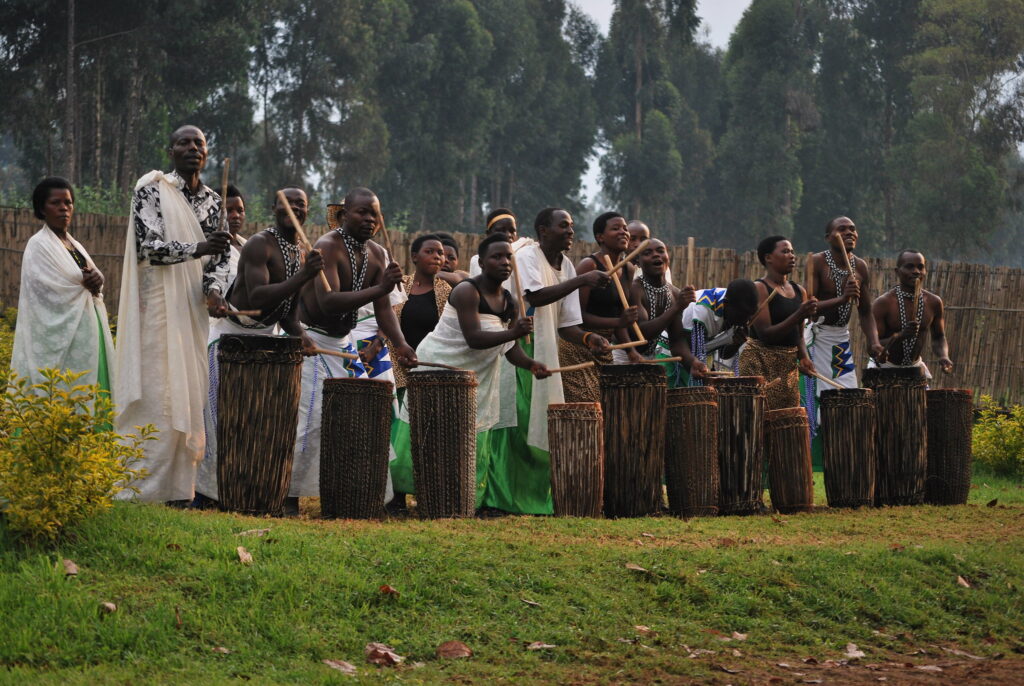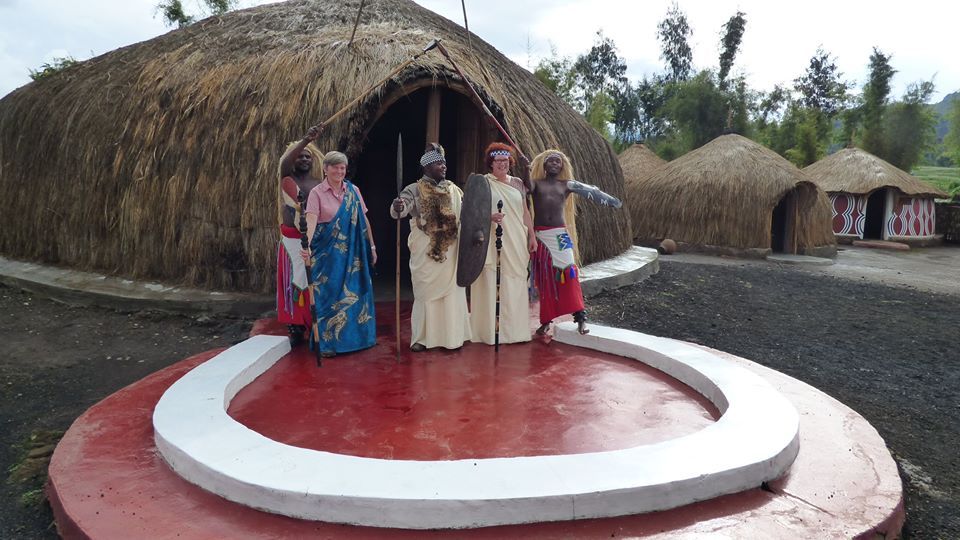Gorilla guardians village : (iby'iwacu cultural village)
The Gorilla Guardian Village in Rwanda, characterized by its stunning landscapes and abundant green hills, is a significant contributor to the nation’s appeal. The Rwandan government, via the Tourism Board, has established the nation as a prominent tourism destination in Africa, despite its limited size and fewer natural resources compared to its neighbors.
The Gorilla Guardian community in Rwanda, often referred to as Ibyi’wacu community, located in the Musanze District, is a noteworthy new attraction for potential travelers to the country. The phrase “Iby’iwacu” translates from Kinyarwanda to “treasures of our home and heritage.” The majority of gorilla safaris in Rwanda conclude without a visit to the traditional community of Iby’iwacu. Visitors can explore and appreciate traditional Rwandan culture at the cultural village. The Iby’iwacu cultural hamlet is distinguished by the predominance of its male population, who are predominantly reformed poachers now engaged in conservation initiatives within Rwanda’s Volcanoes National Park.
The Gorilla Guardian Village in Rwanda is a significant cultural attraction in the country. The Village consolidates Rwanda’s renowned cultural traditions, populace, and historical narratives in a singular venue for exhibition and intimate engagement. International tourists can encounter the quintessential aspects of life in a traditional African village, encompassing the culture, architecture, customary dances, attire, cuisine, herbal practices, and the governance of ancient kingdoms.
Tourists can acquire knowledge about historical hunting tactics, engage in basket and mat weaving, and practice carpentry. This unique experience has captivated numerous individuals seeking to immerse themselves in Rwandan culture following their encounters with gorillas and trekking in the Karisimbi mountains. It is an excellent location to relax while purchasing local crafts, gifts, and souvenirs for friends at home.

In addition to the considerable wealth and visibility it produces, the Iby’iwacu cultural center serves as a cohesive force for Rwanda’s cultural and ethnic groups, including the Tutsis, Hutus, and Batwa. This entertainment center fosters a sense of cohesion grounded in a common shared concept. A number of local artists, including the Batwa, were previously engaged in poaching, and the Gorilla Guardians Cultural Village has afforded them a new option that enables them to sustain their families while diverting them from poaching activities.
What to expect during your visit to the Gorilla Guardian Village in Rwanda?
The Iby’iwacu Cultural Centre offers a variety of intriguing educational experiences while enabling visitors to unwind and immerse themselves in the local culture. Upon arrival at the front entrance, one will be welcomed by vibrant dancing and drumming, signifying the plethora of exhilarating events that lie ahead. Let us examine the following acts in greater detail:
Explore local homesteads within the community
Engaging, exchanging, and thoroughly immersing oneself in the traditions of diverse cultures is the most effective method to comprehend the diversity within humanity. During your tour to the Gorilla Guardians Village, you will have multiple opportunities to explore the cultural uniqueness of Kinyarwanda traditions through home visits and community walks.
A visit to the Gorilla Guardian Village in Rwanda enables you to engage with the inhabitants in their traditional abodes and grass-covered shelters. While you are seated, the elders will impart information and narratives of Rwanda and its profound history and heritage. You will have the opportunity to observe local banana and vegetable crops. You could learn to prepare a classic dish or to produce fine millet flour using a distinctive grinding stone.
The neighborhood stroll serves as a valuable educational opportunity. While engaging with the children and students, a guide will accompany you to examine many local schools and understand the existing education system. During these community excursions, a particularly captivating activity is exploring the diverse local art enterprises that offer regional artwork, woven garments, fine pottery, and further items.
Observe traditional Rwandan dance exhibitions by the Intore dance ensemble.
Music, dance, and theatre define African heritage and culture by fostering a sense of identity. The Iby’iwacu Cultural Village in Rwanda offers guests the opportunity to experience a variety of unique indigenous musical forms, including the Ingoma, Amakondera, Umuduri, Inanga, Iningiri, Ibyivugo, and Agakenke. Every sound is unique, accompanied by its specific musical instruments and dance style/steps.
And such is the Intore dance company. Men adorned in grass garments and little bells encircling their legs perform this traditional warrior dance while brandishing spears, simulating combat or commemorating triumph over an adversary. These young individuals will be enthusiastic in their invitation for you to participate in the dance or, at the very least, to acquire drumming skills.
Tour the historic King's Palace.
The King’s palace, a representation of the governance and courtly life of ancient monarchs, is a captivating site to explore within the Iby’iwacu cultural village. In Rwanda, ancient monarchs were both feared and revered. The rulers wielded absolute authority and rendered decisions that were to be adhered to unconditionally.
All royal festivities and rituals occur at the monarch’s palace, overseen by the monarch, queens, princesses, princes, clan leaders and esteemed guests. The King’s house at Iby’iwacu illustrates an ancient African monarchy, featuring emblems of authority and details of each clan. A guide will elucidate and address any inquiries as you progress through each sign.
Engage with the conventional herbalists and healers.
In ancient times, traditional healers held significant roles within their communities, a function that persists today. Individuals sought their counsel whenever they experienced illness. Traditional healers utilize herbs, tree branches, roots, shrubs, and various plants to address identified diseases. The healers possess knowledge on the administration of these substances and have conducted extensive research on their application, drawing from information and thoughts transmitted over numerous generations.
They take pride in recounting the narrative of how traditional medicine has endured colonial eras to retain its significance in contemporary society. During your visit to the Gorilla Guardians Cultural Village, you will encounter various traditional healers prepared to demonstrate the efficacy of native treatments. Due to their utilization of natural remedies, you are permitted to explore various indigenous flora; you may be astonished to discover a remedy or relief for a long-standing condition.
Visit the adjacent Batwa Community.
The Batwa pygmies were formerly forest hunters and fruit foragers residing in the dense woodlands of Rwanda and Uganda. Governments displaced them from the forests decades ago and resettled them in regions beyond the forest. Certain individuals are designated to the Iby’iwacu Cultural Centre. Since adopting a lifestyle beyond the forest and capitalizing on tourism opportunities, the Batwa have made substantial contributions to the tourism sector in Uganda and Rwanda.
The Batwa have abandoned poaching and hunting-gathering in the bush to acquire skills in pottery, art and design, dance, and theater. Upon visiting the Iby’iwacu traditional village, you will be astounded by their demonstration of hunting skills, including the construction of animal traps and the use of implements such as spears, bows, and arrows.

Sample locally-produced beverage.
In addition to the pleasure and relaxation afforded by alcohol, consuming local beer in a communal context served as a unifying practice within the African traditional social milieu. This was particularly evident during various celebrations, including the new crop and the welcoming of infants. To assimilate and appear involved at these events, one had to participate in the drinking. During your tour to the Iby’iwacu traditional hamlet, you will acquire the skills to produce and ferment banana beer. Active engagement is anticipated, concluding with a sip of the final product.
Essential information to consider before to visiting the Gorilla Guardian Village in Rwanda.
The Iby’iwacu cultural center, akin to any organized establishment, possesses specific norms and traditions that must be adhered to and respected while on its grounds. Consider the following themes while examining the cultural center:
Visitors are prohibited from disposing of waste at the Iby’iwacu Cultural Centre. Trash receptacles have been deliberately positioned throughout the cultural center to maintain order. During your safari, it is imperative to protect wildlife, particularly at the Gorilla Guardians Cultural Village. Visitors are urged to refrain from damaging the natural environment, especially vegetation and other greenery within the town. To avoid seeming impolite, one must be cognizant of local norms and conventions. When dining or welcoming folks in the center, utilize your right hand. It is usual to present gifts with both hands while exchanging with a native.
Always secure authorization prior to utilizing your camera. If you require clarification, do not hesitate to consult your tour guide or the elders. Respect for diversity is particularly essential while visiting a multicultural and ethnic environment such as the Iby’iwacu cultural center. Attire oneself modestly, minimizing skin exposure. International visitors are encouraged to engage in dialogue with locals regarding their respective cultures, as there will invariably be differences and commonalities among civilizations and practices across various locations. While in the village, Engage will also endeavor to appear amiable and unassuming. Exercise patience as the natives impart their knowledge and insights to you. The safety of local populations is prioritized. Please submit any donations or gifts to the relevant authorities.
